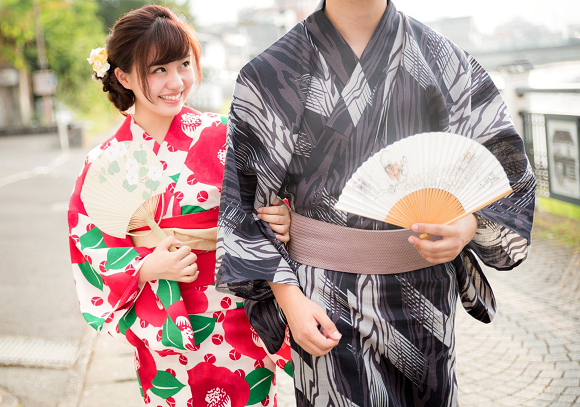
Physical and mental connections alike show up in the top responses.
The blossoming of romance is often a subtle thing, requiring attuned perception of finely nuanced words and actions. Particularly in the modern era, where platonic friendships between men and women have become more common than they were in the past, it can sometimes be heard to tell when you and a member of the opposite sex are still just good buddies, and when you’ve become something more.
To try to get a better handle on the situation, Japanese women’s interest and cinema Internet portal Tokyo Joshi Eiga-bu conducted a survey of 390 women, asking them what line signifies a man and woman have become “lovers” when it’s crossed. Below are the top six responses.
6. “If just the two of us go out to eat or have fun” (2.1 percent of respondents)
This might sound like an incredibly low bar for cementing a romantic relationship, and indeed, the women who chose this are part of a very small minority. That said, Japanese social interactions, particularly with classmates or coworkers, are often group affairs, and so some feel that a man and women leaving out the rest of their mutual acquaintances implies a significant level of emotional intimacy.
5. “If just the two of us go out of town together” (5.7 percent of respondents)
Everything said in entry number six gets cranked up a notch if the man and woman are headed far enough away for it to be classified as a day trip, and even more so if overnight travel is involved.
4. “If we go all the way” (10.5 percent)
Yeah, penetration tends to burst the illusion that two people are nothing more than good pals.
3. “If we hold hands” (13.8 percent)
It’s a little startling to see extended palm-pressing surpass sexual intercourse as an indicator of a legitimate romantic connection, but their relative positions on the list speak to certain attitudes in Japanese culture and society. Japan can be surprisingly blasé in its acceptance that people have physical needs, and what goes on behind the closed doors of a love hotel can, as long as the proceedings remain clandestine, sometimes be shrugged off as consenting adults attending to those needs.
On the other hand, holding hands speaks to a more emotional desire for romantic companionship, so some participants felt made it the more telling sign that a guy and a girl are going steady. Add in the fact that it’s relatively uncommon for friends, or even family members, to hug or otherwise physically show affection, and holding hands seems like an even bolder development in the relationship between two people.
2. “If we kiss” (24 percent)
As a more passionate expression of one’s sentiments than holding hands, but one that many would say isn’t as viscerally satisfying as sex, kissing accounted for almost as many votes as the previous two entries combined.
1. “Unless we tell each other we’re lovers, I don’t think of us that way.” (40.5 percent)
To some, the top pick (and by a wide margin) might sound needlessly dispassionate, or even clueless. But Japanese society places a lot of importance on what it calls the kokuhaku, literally “confession” but generally used to refer to an explicit declaration of affection. It’s such a part of idealized romances, including those depicted in TV dramas and anime, that some people think that until the kokuhaku is done, you really can’t be totally certain that you and the object of your affection are a couple.
It’s a bit ironic, given that Japanese couples are largely considered to be less vocally affectionate than many of their foreign counterparts. Still, if a guy wants a Japanese girl to know he’s serious about her, he’ll probably have to tell her his feelings directly before the relationship can begin in earnest, so it’s a good thing that there are a lot of options for how to phrase that declaration.
Source: Tokyo Joshi Eiga-bu via Value Press
Top image: Pakutaso
Insert images: Pakutaso (1, 2, 3)
[ Read in Japanese ]
It won’t mean you’ve become lovers, but you can follow Casey on Twitter anyway.
[ Read in Japanese ]




 Is work more important to Japanese salarymen than their girlfriends? Survey investigates
Is work more important to Japanese salarymen than their girlfriends? Survey investigates Do Japanese people kiss on the first date? Survey investigates
Do Japanese people kiss on the first date? Survey investigates How often do Japanese people rip silent farts? Survey investigates
How often do Japanese people rip silent farts? Survey investigates How many times a day do Japanese men adjust their junk? New survey investigates
How many times a day do Japanese men adjust their junk? New survey investigates Do Japanese women check out each other’s lingerie at the hot springs? Survey investigates
Do Japanese women check out each other’s lingerie at the hot springs? Survey investigates Foreigner’s request for help in Tokyo makes us sad for the state of society
Foreigner’s request for help in Tokyo makes us sad for the state of society Ghibli Park now selling “Grilled Frogs” from food cart in Valley of Witches
Ghibli Park now selling “Grilled Frogs” from food cart in Valley of Witches Japanese city loses residents’ personal data, which was on paper being transported on a windy day
Japanese city loses residents’ personal data, which was on paper being transported on a windy day Mt. Koya planning to instate visitor’s tax to cope with huge tourist numbers
Mt. Koya planning to instate visitor’s tax to cope with huge tourist numbers Historical figures get manga makeovers from artists of Spy x Family, My Hero Academia and more
Historical figures get manga makeovers from artists of Spy x Family, My Hero Academia and more We try McDonald’s Japan’s new teriyaki burgers
We try McDonald’s Japan’s new teriyaki burgers Harajuku Station’s beautiful old wooden building is set to return, with a new complex around it
Harajuku Station’s beautiful old wooden building is set to return, with a new complex around it Japanese ramen restaurants under pressure from new yen banknotes
Japanese ramen restaurants under pressure from new yen banknotes Kingdom Hearts fan commissions a gorgeous custom engagement ring from Takayas
Kingdom Hearts fan commissions a gorgeous custom engagement ring from Takayas Akihabara pop-up shop sells goods made by Japanese prison inmates
Akihabara pop-up shop sells goods made by Japanese prison inmates McDonald’s new Happy Meals offer up cute and practical Sanrio lifestyle goods
McDonald’s new Happy Meals offer up cute and practical Sanrio lifestyle goods French Fries Bread in Tokyo’s Shibuya becomes a hit on social media
French Fries Bread in Tokyo’s Shibuya becomes a hit on social media Studio Ghibli releases new action figures featuring Nausicaä of the Valley of the Wind characters
Studio Ghibli releases new action figures featuring Nausicaä of the Valley of the Wind characters New private rooms on Tokaido Shinkansen change the way we travel from Tokyo to Kyoto
New private rooms on Tokaido Shinkansen change the way we travel from Tokyo to Kyoto Red light district sushi restaurant in Tokyo shows us just how wrong we were about it
Red light district sushi restaurant in Tokyo shows us just how wrong we were about it Tokyo Tsukiji fish market site to be redeveloped with 50,000-seat stadium, hotel, shopping center
Tokyo Tsukiji fish market site to be redeveloped with 50,000-seat stadium, hotel, shopping center All-you-can-drink Starbucks and amazing views part of Tokyo’s new 170 meter-high sky lounge
All-you-can-drink Starbucks and amazing views part of Tokyo’s new 170 meter-high sky lounge Beautiful Ghibli sealing wax kits let you create accessories and elegant letter decorations【Pics】
Beautiful Ghibli sealing wax kits let you create accessories and elegant letter decorations【Pics】 Studio Ghibli releases Kiki’s Delivery Service chocolate cake pouches in Japan
Studio Ghibli releases Kiki’s Delivery Service chocolate cake pouches in Japan New definition of “Japanese whiskey” goes into effect to prevent fakes from fooling overseas buyers
New definition of “Japanese whiskey” goes into effect to prevent fakes from fooling overseas buyers Our Japanese reporter visits Costco in the U.S., finds super American and very Japanese things
Our Japanese reporter visits Costco in the U.S., finds super American and very Japanese things Studio Ghibli unveils Mother’s Day gift set that captures the love in My Neighbour Totoro
Studio Ghibli unveils Mother’s Day gift set that captures the love in My Neighbour Totoro More foreign tourists than ever before in history visited Japan last month
More foreign tourists than ever before in history visited Japan last month New Pokémon cakes let you eat your way through Pikachu and all the Eevee evolutions
New Pokémon cakes let you eat your way through Pikachu and all the Eevee evolutions Sales of Japan’s most convenient train ticket/shopping payment cards suspended indefinitely
Sales of Japan’s most convenient train ticket/shopping payment cards suspended indefinitely Sold-out Studio Ghibli desktop humidifiers are back so Totoro can help you through the dry season
Sold-out Studio Ghibli desktop humidifiers are back so Totoro can help you through the dry season Japanese government to make first change to romanization spelling rules since the 1950s
Japanese government to make first change to romanization spelling rules since the 1950s Ghibli founders Toshio Suzuki and Hayao Miyazaki contribute to Japanese whisky Totoro label design
Ghibli founders Toshio Suzuki and Hayao Miyazaki contribute to Japanese whisky Totoro label design Doraemon found buried at sea as scene from 1993 anime becomes real life【Photos】
Doraemon found buried at sea as scene from 1993 anime becomes real life【Photos】 Tokyo’s most famous Starbucks is closed
Tokyo’s most famous Starbucks is closed One Piece characters’ nationalities revealed, but fans have mixed opinions
One Piece characters’ nationalities revealed, but fans have mixed opinions We asked a Uniqlo employee what four things we should buy and their suggestions didn’t disappoint
We asked a Uniqlo employee what four things we should buy and their suggestions didn’t disappoint Princesses, fruits, and blacksmiths: Study reveals the 30 most unusual family names in Japan
Princesses, fruits, and blacksmiths: Study reveals the 30 most unusual family names in Japan Japanese women sound off on the line separating a male friend and a boyfriend
Japanese women sound off on the line separating a male friend and a boyfriend Do Japanese men like it when real women speak in anime-style voices? Survey investigates
Do Japanese men like it when real women speak in anime-style voices? Survey investigates Young Japanese women sound off on what does and doesn’t constitute cheating on their boyfriend
Young Japanese women sound off on what does and doesn’t constitute cheating on their boyfriend Is the ideal spouse someone who’s your best friend or your war buddy? Japanese singles sound off
Is the ideal spouse someone who’s your best friend or your war buddy? Japanese singles sound off Three shojo manga/anime scenes Japanese survey respondents wish would happen to them
Three shojo manga/anime scenes Japanese survey respondents wish would happen to them Japanese women asked what they would do if they had a man’s body for one day in survey
Japanese women asked what they would do if they had a man’s body for one day in survey Japanese company will ask your crush out on a date for you if you’re too shy to do it yourself
Japanese company will ask your crush out on a date for you if you’re too shy to do it yourself Park in Japan offers special love confession plans with 6 million lights
Park in Japan offers special love confession plans with 6 million lights When is the right time for a love confession in Japan?
When is the right time for a love confession in Japan? How should a guy say “I” in Japanese? Japanese women give their opinions【Survey】
How should a guy say “I” in Japanese? Japanese women give their opinions【Survey】 Japanese women reveal how far they’ve gone in “stalking” a guy they like in survey
Japanese women reveal how far they’ve gone in “stalking” a guy they like in survey 12/21 is Japan’s “Long Distance Lovers Day”: What makes it so hard to keep up long distance love?
12/21 is Japan’s “Long Distance Lovers Day”: What makes it so hard to keep up long distance love? How much do Japanese men and women pay on dates? Survey finds large gap
How much do Japanese men and women pay on dates? Survey finds large gap
Leave a Reply